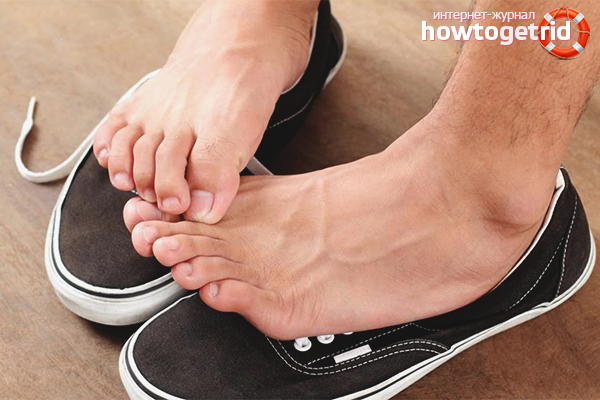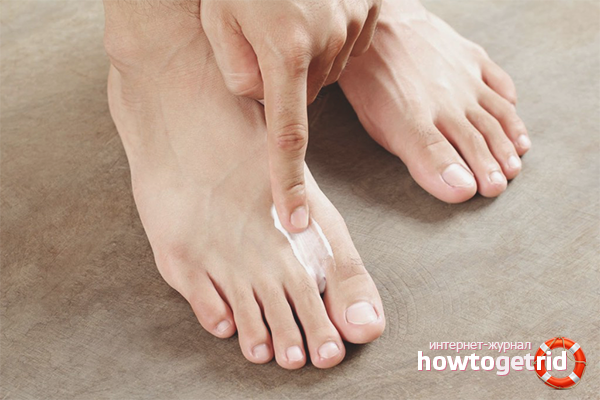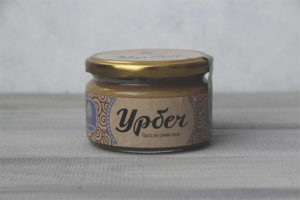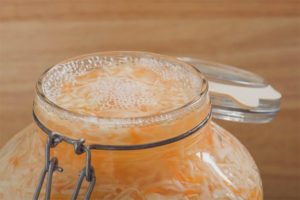The content of the article
Each of us at least once in our life has come across an unpleasant smell of our feet. On the feet there is a huge amount of sweat glands, which release more than 100 ml of fluid per day. Normally, the sweat evaporates quickly, without causing any inconvenience. However, sometimes for various reasons, moisture cannot evaporate, for example, due to poor-quality shoes or socks. As a result, the legs prey, microbes on the surface of the legs multiply especially quickly, which in turn contributes to the appearance of an acidic and unpleasant odor. Sweaty and smelly feet are a real problem. You cannot suddenly go on a visit, you cannot take off your shoes in front of people if necessary. In some cases, the smell becomes so sharp that it is felt even without removing shoes. This gives rise to the development of complexes, so the situation urgently needs to be changed. Moreover, to cope with such a problem is not difficult. In this article, we will talk about the unpleasant smell of the legs - why it appears, how to deal with it yourself and what to do if the smell does not go away for a long time.
Why do legs smell
Fetid odors can be associated with various reasons - non-compliance with hygiene standards or physiological characteristics of the body. Excessive sweating on the feet can even indicate some diseases. Consider the provoking factors in more detail.
- Poor quality shoes. We appreciate the good and expensive leather shoes for the features of natural material. The fact is that the skin passes moisture from the inside, that is, it does not prevent the evaporation of sweat, due to which the leg does not remain wet, does not fray. At the same time, the skin does not allow moisture outside - you can safely wear such shoes in wet weather. Therefore, tight shoes made of cheap synthetic materials are one of the common causes of unpleasant foot odors. This is especially true for men, because almost always men's shoes are represented by completely closed models.
- Socks, stockings, socks. The same effect of the sauna can be achieved if you use textiles made from artificial materials. Most often we are talking about synthetics - it does not allow moisture and air to pass through.
- Hygiene. All people sweat - this is absolutely normal. But the difference is that in one person the sweat is completely odorless, and in another there is a sharp fetid aroma even with minor physical exertion. It's all about the bacteria that live on the skin. If you do not follow the basic rules of hygiene and rarely wash, the bacteria will actively multiply, the smell will be pronounced. Legs have a particularly unpleasant smell if you put shoes on your bare foot without a sock, if you constantly walk in closed shoes in warm weather, if you don’t change your wet shoes and socks, etc.
- Fungus. When an unpleasant odor appeared recently, and you cannot find an explanation for this - for example, you did not buy new shoes, wear socks made of natural fabric, etc., it could be a nail fungus. Carefully inspect the skin of the feet and nails. If there are areas on the epidermis with peeling, burning, redness, if the nails are cloudy or in some places become thicker, this is a fungus. The sooner you start treatment, the faster you will get rid of the problem. It is better to deal with the fungus comprehensively and be sure to consult a doctor.
- Physiology and diseases. As you know, the characteristics of the body are different for everyone, someone sweats especially hard, someone on the contrary, practically does not experience sweating.However, it is noted that men sweat more than women, this is normal, which means that unpleasant odor from the feet of the stronger sex occurs much more often. In addition, increased sweating is more often observed in obese people, patients with hormonal disorders, and in diabetics. Excessive sweating of the legs may indicate diagnoses such as tuberculosis, VVD, heart and vascular disease. Also, a person can be diagnosed with hyperhidrosis, when in general a person sweats very actively - not only the legs, but also the armpits, neck, and other parts of the body.
- Hormones. Human nature relates its various manifestations to the animal world. Hormonal changes in some cases lead to excessive sweating. For example, during puberty, teenage boys sweat more than usual, so the body attracts "individuals" of the opposite sex. After a couple of years, the hormonal background of the young man is normalized, excessive sweating will pass, but for now you will have to adhere to hygiene rules especially carefully. Very often, women complain of increased sweating after childbirth. But here, nature does everything for certain purposes - excessive sweating of a woman after childbirth is necessary for the baby so that he can find his mother by smell, because the rest of the senses are not yet developed.
- Nutrition. Excessive content of sharp, salty and spicy foods in the food contributes to the release of “pungent” sweat, which has a particularly unpleasant odor.
To cope with persistent amber, you need to identify the cause of its appearance. In most cases, the provoking factor lies in improper or inadequate hygiene.
Hygiene rules for controlling bad breath
After all the procedures carried out on dry skin, you need to put on a clean cotton or linen sock, wear high-quality shoes. In the warmer months, try to pick up ventilated models. Even men's shoes have flight options - with tiny holes for ventilation. Have two pairs of shoes for each season to wear shoes every other day. If you constantly wear only one pair, it will not have time to dry thoroughly overnight, this will lead to an increase in odor. With heavy sweating, you can put pieces of crumpled newspaper or sawdust in a bag into your shoes - these substances perfectly absorb moisture. Wear clean socks every day, even if you think your legs weren’t sweating at all yesterday.
If your feet sweat a lot during the day, you can carry clean socks and removable insoles with you, you can change shoes in the toilet. Before leaving the house, you can sprinkle your feet with baking soda, talcum powder or starch - bulk substances perfectly absorb moisture, protect the foot from dampness. From time to time it is necessary to treat with antiseptic compounds not only the legs, but also the shoes on the inside, for example, a solution of potassium permanganate, after which it is necessary to allow the shoes to dry thoroughly. Regularly need to do contrasting foot baths - this improves the functioning of blood vessels, enhances blood circulation in the feet, after such training the legs will sweat much less.
Pharmaceuticals against unpleasant foot odor
In the fight for clean and well-groomed legs, you can use numerous pharmacy products. Most of them have a complex effect - they inhibit the production of sweat, disinfect the surface of the skin, eliminate bacteria and have absorbent properties.
- Deodorants for legs. These are special tools that are designed to get rid of an unpleasant odor. For example, antiperspirants suppress the work of sweat glands, legs simply do not sweat. However, they should be used only during the day, at night the legs should breathe. Therapeutic antiperspirants are sold at the pharmacy, among them Klima Spray, FreshFooot, Neutra-Active. In addition, there are deodorants that do not completely inhibit perspiration, but significantly minimize it - Deocontrol, Vichy. Many of the drugs have an antibacterial effect to suppress the development of pathogens, which are the cause of the fetid odor.
- Antifungal agents. If you have a fungus, you need to use antimycotic drugs that will help you get rid of the problem of foot odor. This group of drugs can be presented in the form of drops, ointments, lotions and even nail polish. The most effective brands to date are Exoderil, Batrafen, Lamisil, Loceryl, etc. Apply antifungal agents should only on a clean and dried surface of the skin, the nail should be as much as possible sawn. The treatment is quite long - antifungal agents should be used for several months until the diseased nail is completely replaced by a healthy nail plate.
- Creams and lotions. These are special tools that can be used constantly. They not only eliminate odor, but also have a medicinal effect. That is, with a course intake, the legs will stop smelling and sweating, even if you stop using medicinal formulations. Among these creams, the most effective and effective ones can be distinguished - Dry-Dry, Lavilin, Deo-control from Kalina, Green Pharmacy.
- Inexpensive pharmacy products. Among the expensive specialized creams, you can find cheap, but no less effective drugs that are sold in every pharmacy. Teymurov's paste is considered the most common and effective means - it perfectly dries and disinfects the surface of the skin. It is useful to apply Boric Acid, Formidron, Burnt Alum, Lavender Oil, etc. to the feet.
The substances presented can simply be rubbed into the skin, or you can make none of them based on the bath. Regular water procedures, especially cool ones, will help normalize the functioning of sweat glands.
Folk remedies in the fight against sweating feet
You can get rid of the unpleasant odor with the help of simple recipes, the ingredients for which are in every home.
- Vinegar and alcohol. Mix the two ingredients and keep the mixture in a special bottle. Wipe your feet with a prepared solution every morning and evening. Vinegar fights fungus and skin lesions, alcohol perfectly kills bacteria.
- Baths. You can soak your feet in special antiseptic solutions. It can be bleach for laundry - just two tablespoons per liter of warm water. Strong tea can be added to the water - it contains a lot of tannins that dry the skin. You can make baths based on herbal decoctions and oak bark, you can add sea salt, baking soda and ground tablets of furacilin to the water. All this will quickly and permanently relieve the unpleasant amber.
- Laundry soap. Ordinary laundry soap not only has a pronounced antibacterial effect. It contains salicylic acid, which dries the skin. This will help get rid of excess moisture in the shoes.
- Citrus Peel. It is very useful to wipe the feet with slices of lemon or orange before a long working day. Acid inhibits the development of bacteria, in addition, the legs acquire a light citrus aroma.
- Horsetail. Horsetail is an excellent medicine that can cope with hyperhidrosis. Based on the broth, you can make baths, but not everyone wants to bother with preparing the broth every day. It is much more convenient to prepare an alcohol tincture. A bottle of dark glass should be filled with fresh horsetail, pour alcohol or vodka on top, let it brew for 20 days. After that, the tincture is filtered and stored in the refrigerator for up to three months. If necessary, wipe with horsetail tincture of the foot - the smell will not bother you for another 6-8 hours after treatment.
- Beer and pomegranate peel. On the basis of pomegranate skin, you need to prepare a strong broth - about three tablespoons of crushed raw materials per liter of boiling water. Boil the composition in a water bath for at least half an hour, let it brew under the lid for a couple more hours. Then the broth should be filtered and add a glass of unfiltered beer to it. Dip the legs into the resulting liquid, leave for 15-20 minutes. Pomegranate contains a lot of tannins, which dry the skin, and brewer's yeast normalizes the work of sweat glands, sweating becomes less pronounced. Doing such baths 2-3 times a week and only the memories will remain of the unpleasant smell.
In the fight against unpleasant foot odor, it is very important not the remedy chosen for treatment, but the regularity of its use. With hygiene and the alternation of medicinal creams, baths and rubbing, you can get rid of unpleasant odors in a week.
The easiest and most romantic way to get rid of the unpleasant foot odor is to walk along the morning dew. But do not try to do it in an urban lawn, where dogs are often walking - the effect may be the opposite!
Video: what to do if your feet stink











Submit